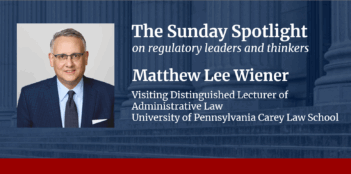
New research highlights the unique challenges agencies face when providing individual regulatory guidance.
Agencies routinely advise members of the public about how the law applies to them. A taxpayer who wants to know the likely tax consequences of a proposed transaction can seek a private letter ruling from the Internal Revenue Service (IRS). The IRS might decline to rule, but if it does rule, no one other than the requesting taxpayer can rely on its ruling.
Similarly, an employer seeking to clarify whether overtime pay is due and how to calculate it under the Fair Labor Standards Act can request an opinion letter from the U.S. Department of Labor’s Wage and Hour Division. Under the applicable statutes and regulations, the requester or any other similarly situated member of the public can rely on it in good faith.
By contrast, when a division of the U.S. Securities and Exchange Commission (SEC) issues a no-action letter stating that staff will not recommend an enforcement proceeding against the requester, that letter represents the view of a specific division only and not the agency. It is no shield to a subsequent enforcement action.
Advisory opinions, letter rulings, opinion letters, and no-action letters are all common examples of “individualized guidance,” or guidance that agencies produce in response to a request by an individual person or entity about how the law applies to the person or entity’s specific circumstances. Individualized guidance clarifies the law and aids compliance, but the processes for requesting, producing, and using individualized guidance—and its varied legal effects—remain obscure. The Administrative Conference of the United States (ACUS) commissioned me to conduct a study on the topic and, relying on my report, adopted a recommendation with 15 agency best practices on individualized guidance at the June 2024 plenary session.
When ACUS commissioned my report, it had recently studied and issued several recommendations on guidance, and I began my research conceiving of individualized guidance as merely a subset of “guidance” under the Administrative Procedure Act (APA)—that is, as a subset of either interpretive rules or policy statements, both forms of non-binding rules. Some individualized guidance documents are properly characterized as such, but others are not “guidance” under the APA. Instead, they have a binding effect and are better considered adjudicatory orders.
In my report, I focused on seven substantive regulatory areas, and I conducted over 30 interviews with current and former agency officials and representatives of regulated firms.
I found significant variation across agencies. To start, not all agencies provide individualized guidance. Some view it as beyond their mission or as a potential source of unfairness that privileges recipients of advice over those who do not receive any. But, many agencies do provide individualized guidance and view it both as within—or even central to—their mission and a way to level the playing field for regulated parties lacking access to the advice of expensive legal counsel.
Regarding agencies that provide individualized guidance, I found significant variation in the formality, statutory basis, level of agency personnel involved, and legal effect of their individualized guidance documents. Some agencies implement statutes that call for the agency to issue advisory opinions, whereas others have no such statutory mandate but do so in their discretion to promote good governance. In some agencies, high-level agency officials ratify individualized guidance documents, such as advisory opinions that the Federal Election Commission issues after a vote of the Commissioners. In other agencies, such as the SEC and the Commodity Futures Trading Commission, staff provides individualized guidance in the form of no-action letters or interpretive letters without high-level agency review or ratification.
Given the tremendous variety in agency practices, the following recommendations adopted by the ACUS Assembly offer a starting point for structuring agencies’ provision of individualized guidance.
First, resources, priorities, and mission permitting, agencies should provide individualized guidance, and they should develop policies regarding whether and when requesters or other members of the public can rely on it. Some agencies expressly protect reliance by providing a requester or others with an affirmative defense to enforcement based on the same or substantially similar conduct described in a requested guidance. Other agencies limit reliance to the requester or specify that the individualized guidance reflects the views of specific staff members rather than the agency, and so cannot be used as a defense to enforcement. Clarifying the scope of permissible reliance should help members of the public plan their conduct and minimize surprises.
Second, transparency and consistency should be promoted in individual guidance procedures. Most agencies that offer individualized guidance publish on their website information about how to request individualized guidance, but the ACUS recommendations go further, calling for agencies to publish individualized guidance procedures in the Federal Register to provide the public with official notice. Agencies should explain, among other things, the process for requesting individualized guidance, the matters on which they will or will not provide individualized guidance, what information should be included in a request for guidance, and any associated fees. Agencies should also develop protocols for tracking requests and maintaining a repository of past responses to requests that agency personnel can consult when addressing new requests. This change will likely cultivate consistency over time and across personnel.
Finally, agencies should make available on their websites individualized guidance documents that may be of interest to persons other than the requester, such as other regulated persons or regulatory beneficiaries. Agencies should further strive to keep individualized guidance current and explain any modifications or rescissions.
Advising the public is a crucial function of agencies, and with these recommendations, they can continue to assess and improve upon their existing practices and protocols regarding individualized guidance.
This essay is part of a series, titled “Seeking Continuous Improvement to the Administrative Process.”




